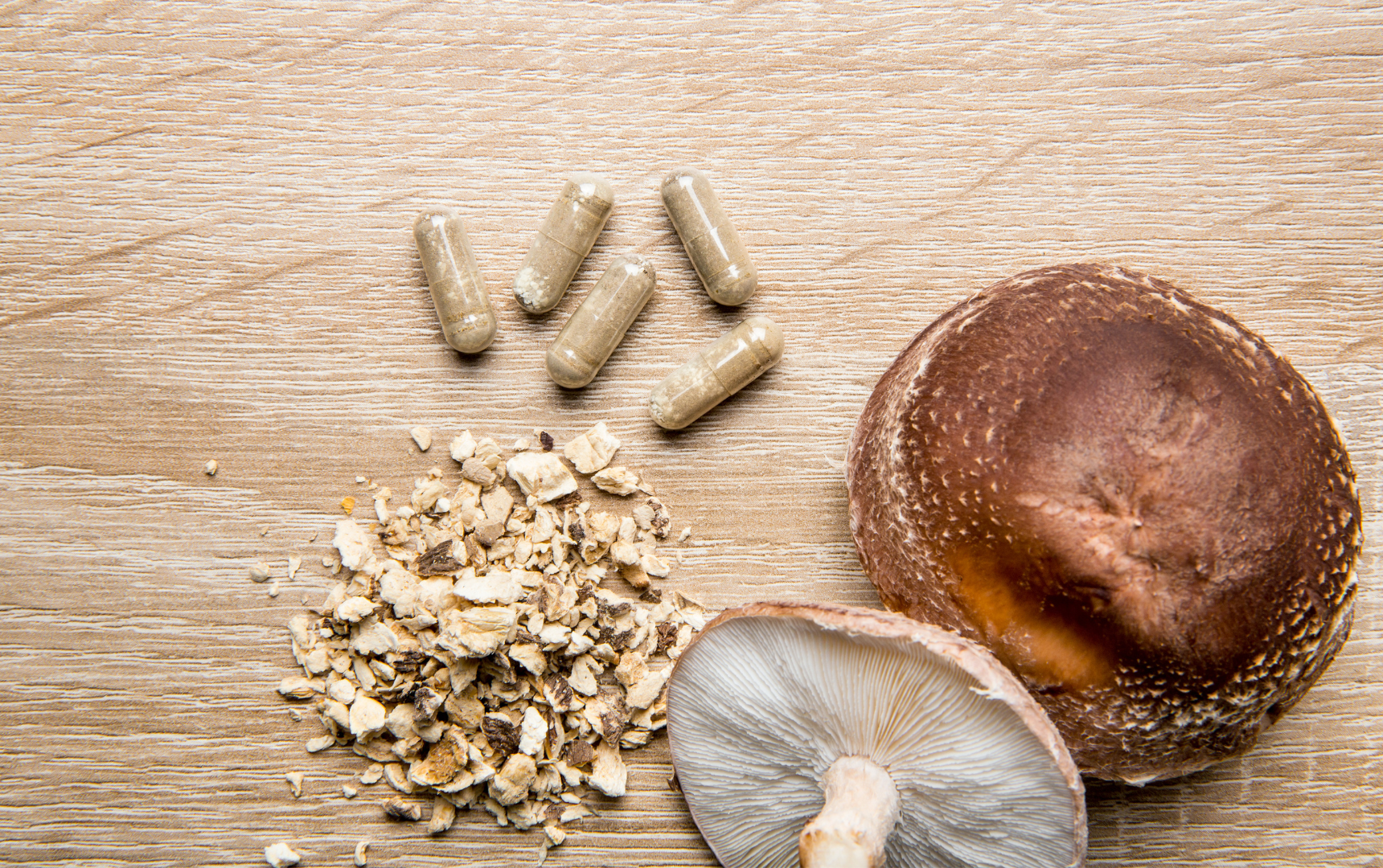
Once you begin a journey down the rabbit hole of functional mushrooms (aka medical mushrooms), you may find you have a lot to consider. Which functional mushrooms are also adaptogenic mushrooms? Which are best for what health benefits? Can you use them all together?
One item to consider is whether to use medicinal mushrooms in extract or non-extracted form. We’ll discuss both so you can make an informed mushroom decision.
What Is Mushroom Extract?
Extraction is a process in which the beneficial compounds are extracted from the fruiting bodies or mycelium of mushrooms by applying a solvent and possibly heat. The extraction process helps break down the cell walls, allowing the full benefits of the mushrooms to be released. A mushroom extract is processed differently from whole mushroom ground into a powder (although extracts come in powder form).

What Are the Health Benefits of Mushroom Extract?
The practices of Traditional Chinese Medicine and Ayurvedic Medicine have both relied on mushrooms for many health benefits.
Some of the most important are:
- Immune system support. Most functional mushrooms, including reishi mushroom, turkey tail, chaga, and lion’s mane mushroom, offer immunomodulatory effects that can help support a healthy, balanced immune response.
- Antioxidants. Mushrooms like turkey tail, cordyceps, shiitake, maitake, reishi, and lion’s mane all have antioxidant properties that allow them to help protect the body against oxidative stress.
- Adaptogenic mushrooms, like cordyceps and reishi, are able to help the body fight the effects of stress and support regulated levels of hormones like cortisol.
- Cognitive support. Lion’s mane mushroom, traditionally used by Buddhist monks to enhance brain power and focus during meditation, has been shown to support better cognitive function and neurological health.
The benefits of each individual mushroom vary, but considering a mushroom supplement is a natural and holistic way to help support your body. Because mushrooms are so popular, you can often find them available as mushroom teas, powders, and supplements.

How Is Mushroom Extract Different From Mushroom Powder?
If you’re considering a new mushroom product, you want to make sure that the active compounds in the mushroom are available to your body to absorb in the final product you take. That comes down to processing.
Processing
Non-extracted mushroom powder is made by simply drying and grinding the mushroom. In contrast, mushroom extract is created using solvents such as water and/or alcohol to break down cell walls and draw out the beneficial compounds.
If the extract being made is an alcohol or glycerin-based tincture, then the extract remains in liquid form. However, if a powdered extract is being made, then the liquid extract is dried into a powder.
To summarize, mushroom extract powder is different from mushroom powder. Both are powdered, but extract powder is more potent and more bioavailable.
Bioavailability
Due to the alcohol and/or hot water extraction process, compounds such as beta-glucans, triterpenes, and polysaccharides are more bioavailable in mushroom extracts as compared to non-extracted mushroom powders.
That may make you wonder if it is more beneficial to use a mushroom extract as opposed to dried mushroom that has been ground into powder. There are two reasons why this is true.
First, both mushroom extract and mushroom powder contain the same compounds, but the chitin (cell walls) of mushrooms make it difficult for our bodies to break down these compounds. That means they pass right out of the body.
In extraction, the beneficial compounds we want are extracted from the cell wall, making them easily absorbed.
Some mushroom extracts are also “concentrated.” That means you get more of the compounds in a smaller dose. For instance, in a 10:1 extract, you’d get 10 grams of mushroom per 1 gram of extract powder. Essentially, that’s more mushroom bang for your buck.
The takeaway is that if you want the most benefits, an extract is the better choice.
Use in Products
Mushroom extracts are typically found in supplements due to their high potency, whereas mushroom powders are more commonly used in a wider variety of products, including food, teas, and cosmetic products.
Tinctures are typically alcohol-based, so all of the mushroom’s beneficial compounds might not be as bioavailable. This is because while alcohol is ideal for extracting non-water soluble compounds like triterpenes, hot water is the best solvent for water soluble compounds like beta-glucans – the main active ingredient in most medicinal mushrooms.

Taste and Texture
Mushroom extracts generally have a stronger taste but are very fine in texture and can be seamlessly incorporated into capsules and other forms of supplements. Meanwhile, mushroom powders have a milder taste but can be coarser, so they may also contribute to a grainy texture in food products.
The mushroom fruiting bodies of adaptogenic and functional mushrooms might not be as palatable as mushrooms you’re used to consuming on your salad. In fact, some of them are very bitter. At JOYÀ, we use the highest quality mushroom extracts with the most mild taste, and expertly blend them into our chef-crafted Functional Chocolates, which are undeniably delicious.
Purity
Anytime you’re purchasing a supplement, you run up against the fact that their regulation by the Food and Drug Administration (FDA) is limited. That means you might not know for certain what’s inside the product you’re buying.
Mushroom powders that are marketed for use in food products are not required to be third-party tested to ensure quality or purity. At JOYÀ, you can trust our Functional Chocolates because our mushrooms are all lab tested before they are exported from their country of origin, and our mushrooms and finished products are then third-party tested again before and after production to ensure they are free from heavy metals, mold, yeast, and other toxins and microbes.
Price
Due to the extensive processing involved, mushroom extracts can often be more expensive than mushroom powders. However, if you’re taking a mushroom supplement to support your wellness, you want one that will be usable by your body and actually work.
A ground mushroom powder may contain the compounds you want, but unless those cell walls are broken down like they are in mushroom extracts, you’re (quite literally) flushing your money and your mushrooms down the toilet.
Mushroom Quality
Both mushroom powders and mushroom extracts may contain all parts of the mushroom, including the fruiting body and/or the mycelium. The fruiting body is the actual mushroom—the cap and stem—while mycelium is the “root system” of the mushroom.
Mushroom fruiting body contains significantly more active ingredients. Additionally, commercially produced mycelium is often grown on a substrate like grain such as oats, so you’re paying for and consuming this filler.
At JOYÀ, we use only the fruiting body extracts of functional mushrooms in all of our Functional Chocolates so that every bite and sip is pure and packed with the power of mushrooms.
Are There Any Side Effects of Using Mushroom Extracts?
Mushroom products are generally well tolerated, with gastrointestinal upset being the most commonly noted side effect. You may experience fewer gastrointestinal issues with an extract because the fibrous cell wall has been broken down prior to digestion, making it easier on your digestive tract and gut.
If you find that one mushroom product doesn’t work for you, you might not be dealing with a quality product. Try a different product or ease into using your new mushroom product by only using it once every other day.
Before you start any supplement, you should check with your healthcare provider to determine whether a mushroom supplement is right for you. It’s important to ensure that any current medications you might take won’t be affected by your supplements and vice versa.
The Bottom Line
You’ve got choices in the fungi kingdom. For access to the most benefits in a format your body can easily absorb, mushroom extracts are your go-to solution. You can find them in JOYÀ’s Functional Chocolates.
